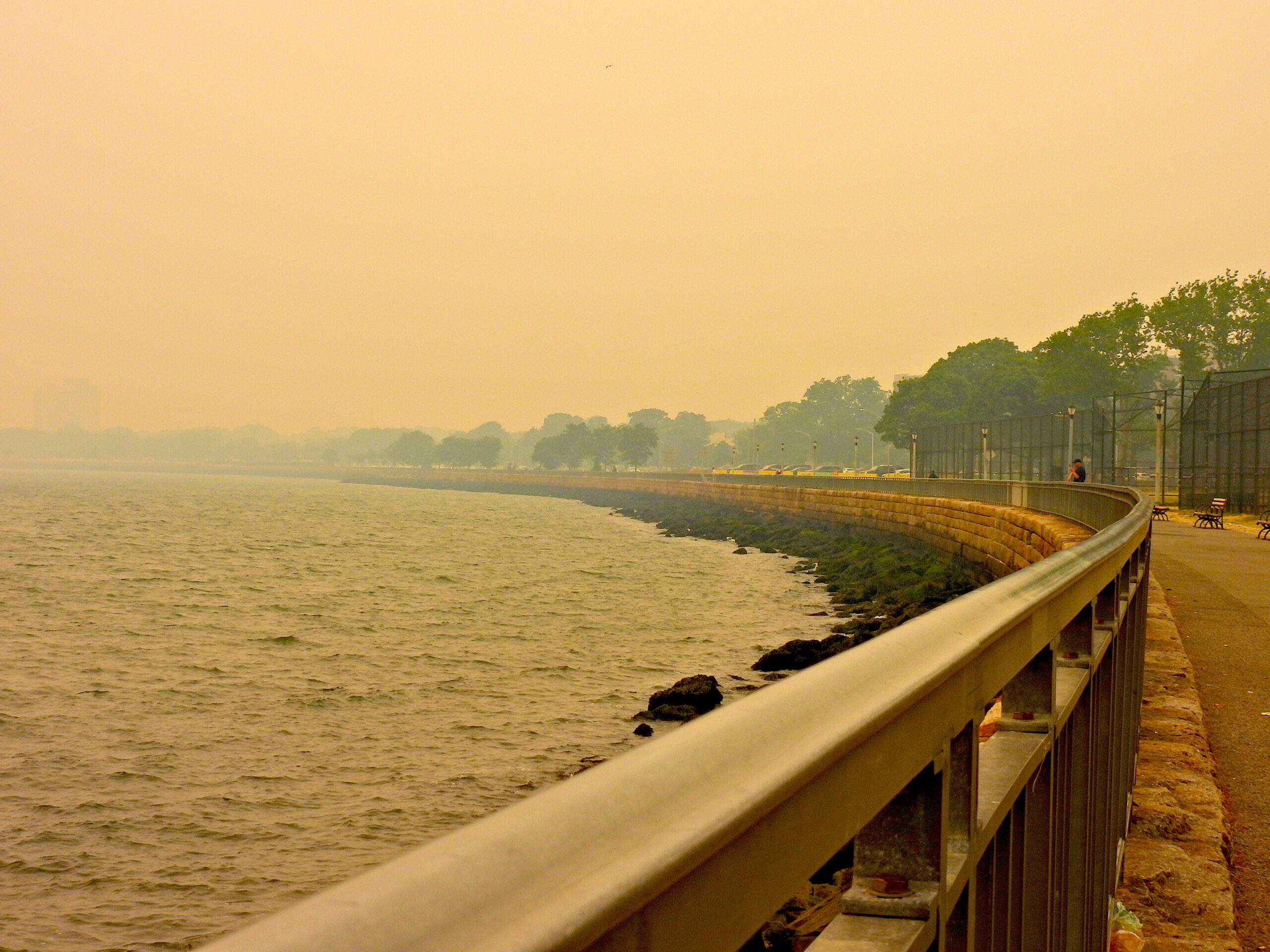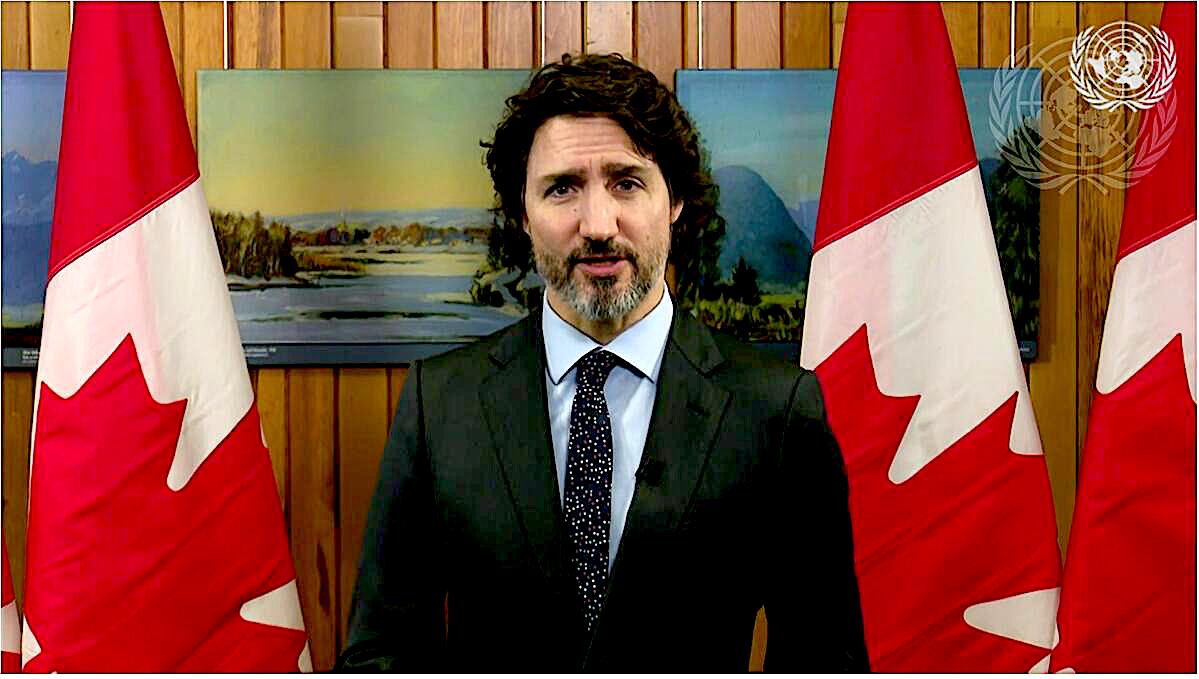As news of Suncor’s involvement with the Canadian government’s carbon plan broke, smoke from raging wildfires in the country was choking large parts of the neighboring U.S.

The Brooklyn, N.Y., coastline at Ceaser’s Bay obscured by smoke from a Canadian wildfire on June 7. (Gedalya Lubman, Wikimedia Commons, CC BY-SA 4.0)
By Jessica Corbett
Common Dreams
As wildfires continued to cause air pollution problems across eastern North America, a Canadian environmental publication revealed it obtained documents showing that fossil fuel giant Suncor “provided input on the first draft” of the Canadian government’s forthcoming Carbon Management Strategy, in effect helping to draft their own regulations.
Highlighting the “important reporting” from The Narwhal‘s Carl Meyer, Torrance Coste — national campaign director at the Wilderness Committee, a Canadian nonprofit — tweeted that “carbon capture and storage is a scam, and as these documents show, the call is coming from inside the house.”
Meyer, an investigative reporter at the nonprofit Canadian media outlet, shared details from a February 2022 briefing note prepared for Natural Resources Canada Deputy Minister John Hannaford — whom Prime Minister Justin Trudeau has just named as clerk of the Privy Council and secretary to the Cabinet, a promotion set to take effect later this month.

Canada’s Prime Minister Justin Trudeau during a U.N.’s virtual climate adaptation summit in 2021. (UN Photo/Evan Schneider)
The briefing note was developed for a meeting with Jacquie Moore — then Suncor’s vice president of external relations and now its top lawyer — and lobbyist Daniel Goodwin that “served as Hannaford’s introduction to some Suncor ‘key initiatives,’ including the company’s membership in the ‘Oilsands Pathways to Net Zero Alliance,’ the former name of the Pathways Alliance, which was then a fledgling organization in the oilpatch,” Meyer reported.
“The alliance wants to soak up at least $10 billion in public funding to build a mammoth, unprecedented system that would capture carbon from oilsands operations in Alberta and pipe it to an underground reservoir in the province’s east,” the journalist noted.
This is such a clear example of how neoliberalism enables harm. Canada is letting one of our largest polluters draft their own regulations. How can we trust them to craft a strong climate strategy when any [potential] limits may impact their profitability? #CDNPoli #ABPoli #ABLeg https://t.co/h2IFoQu0gA
— Phillip Meintzer (he/him) (@PhillipMeintzer) June 8, 2023
While serving as Suncor’s vice president of regional development, Chris Grant was chosen to be on a “thought leaders’ senior reference group” for the government plan — previously known as the Carbon Capture, Utilization, and Storage (CCUS) Strategy —according to the briefing note. Grant has since retired from the Calgary-based energy company.
[Related: The Corporate Capture of Global Biodiversity Agenda]
Grant, Suncor and the Pathways Alliance did not respond to requests for comment. Natural Resources Canada spokesperson Michael MacDonald told The Narwhal that “Suncor’s input had no impact whatsoever on the timelines for the development of the strategy,” the company was “one of nearly 1,500 organizations and individuals” who weighed in, and “input was solicited from all interested Canadians” online from July 2021 to November 2022.
MacDonald also said that members of the 13-person advisory board, including Grant, “were asked to bring their expertise and experiences to the table as individuals, not as representatives of their respective organizations.”
The board included a University of Alberta professor; a clean energy consultant; a Shell Canada manager; the NRG COSIA Carbon XPrize executive director; CEOs of CarbonCure and Svante; president of Wolf Carbon; vice presidents at BMO’s Impact Investment Fund, Carbon Engineering, Cement Association of Canada, International CCS Knowledge Center, and Scotiabank.
Meyer reported that the panel — convened by Drew Leyburne, Natural Resources Canada’s assistant deputy minister for energy efficiency and technology — met three times between April and July 2021, then corresponded over email the following year. One member said they served as “a sounding board,” providing “casual, nonbinding, nonconsensus advice.”
The government spokesperson did not say when the plan will be released but said that “it was determined that a more holistic view of carbon management solutions was necessary in this space,” given that CCUS “technology is not, on its own, a silver bullet to combat climate change,” but it is “one component of an overarching strategy” that will also include nature-based solutions such as tree-planting and wetland restoration along with other technologies like direct air capture.

Suncor Energy Centre in Calgary, Canada. (Bernard Spragg. NZ/Flickr, Public domain)
Some global campaigners and experts have long argued that CCUS is “a false solution” that has become “a dangerous distraction driven by the same big polluters who created the climate emergency,” as Common Dreams has reported.
Critics have also warned that industries promote “nature-based solutions” so they can “keep burning fossil fuels, mine more of the planet, and increase industrial meat and dairy production.”
as the entire country burns, one has to wonder: should fossil fuel companies be weighing in on our national climate change policy? https://t.co/JCdTLKXxwb
— Michelle Cyca (@michellecyca) June 8, 2023
The reporting on the Canadian government’s evolving carbon plan came as smoke from Canadian wildfires — intensified by global heating largely driven by fossil fuels — disrupted travel and outdoor activities across the U.S. East Coast as officials warned millions of people to stay indoors due to poor air quality.
Fatima Syed, Meyer’s colleague at The Narwhal, tweeted that “this story is bonkers when you consider wildfires.”
Emma McIntosh, another reporter at the outlet, similarly said that his “scoop feels like a bad joke when you read it under a layer of wildfire smoke: Suncor, a massive oil company, helped the federal government write its climate change strategy. Which is now a year late.”
Jessica Corbett is a staff writer for Common Dreams.
This article is from Common Dreams.
Views expressed in this article and may or may not reflect those of Consortium News.
Support CN’s Spring
Fund Drive Today


Classic non-sequitur. You imply a connection to the current wildfires and Suncor lobbying the Canadian govt, without making any connection. Was the wildfire caused by God’s wrath? Btw planting and burying fast growing trees is a better way sequester CO2.
Nothing surprising here. What would have been surprising is if there were no fossil fuel company guiding policy relating to Canada’s Carbon Management Strategy.
When the government communicates I hear a business tool. So modestly regulatory any more it seems to me. Educating fellow consumers, consolidating efforts looks more productive than rehashing old revealations.
Whatever it takes…drown these murderous companies, regardless of after effects…which couldn’t be any worse than what they are causing every day all over.
Where is the scandal??? Stakeholder consultations are part of democracy and an essential part of every policy design process. A government is not doing its job if it’s not listening to all the parties.
How many polluting cars can we replace with electric cars and bikes and improved mass transit with a whopping $10 billion to spend? I’d say the likely weakness with this solution is that the bang for the buck is less efficient that other things we need to do. Since we are already behind, lets start with the things that accomplish the most. I doubt that making carbon-fuel production to be ‘net-zero’ (not counting the actual burning of the fuel) is high on that list.
If the “Cement Association of Canada” wants to be a part of the solution, well, we need to rebuild our cities to reverse decades of energy-wasting urban sprawl. I think we can find some work for them.
Drowning men, clutching at straws.